Impact of diet on obesity in England
Added on 2021-04-16
58 Pages12988 Words50 Views
Running head: DIET AND OBESITY
Diet and Obesity
Name of the student
University name
Author’s note
Diet and Obesity
Name of the student
University name
Author’s note
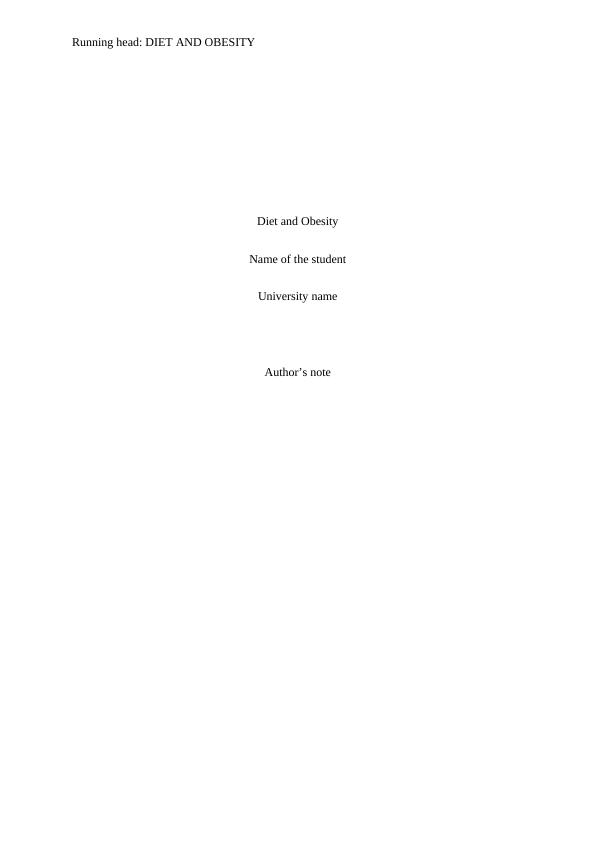
1DIET AND OBESITY
Abstract
The current study focuses upon the impact of diet on obesity on the 40- 60 age group
in England. In this respect, focus has been shifted to a number of lifestyle habits and
approaches along with psychological perspectives which further govern the eating habit in
individuals. It has been seen that sedentary lifestyle along with homeostatic imbalance have
been seen to trigger development of obesgogenic conditions. At any pint of time less
expenditure compared to more intake of high calorific food can contribute towards the
development of obesogenic conditions. This is further influenced by a number of
psychosocial conditions such as self beliefs and perceptions along with environmental
stimulus.
Abstract
The current study focuses upon the impact of diet on obesity on the 40- 60 age group
in England. In this respect, focus has been shifted to a number of lifestyle habits and
approaches along with psychological perspectives which further govern the eating habit in
individuals. It has been seen that sedentary lifestyle along with homeostatic imbalance have
been seen to trigger development of obesgogenic conditions. At any pint of time less
expenditure compared to more intake of high calorific food can contribute towards the
development of obesogenic conditions. This is further influenced by a number of
psychosocial conditions such as self beliefs and perceptions along with environmental
stimulus.
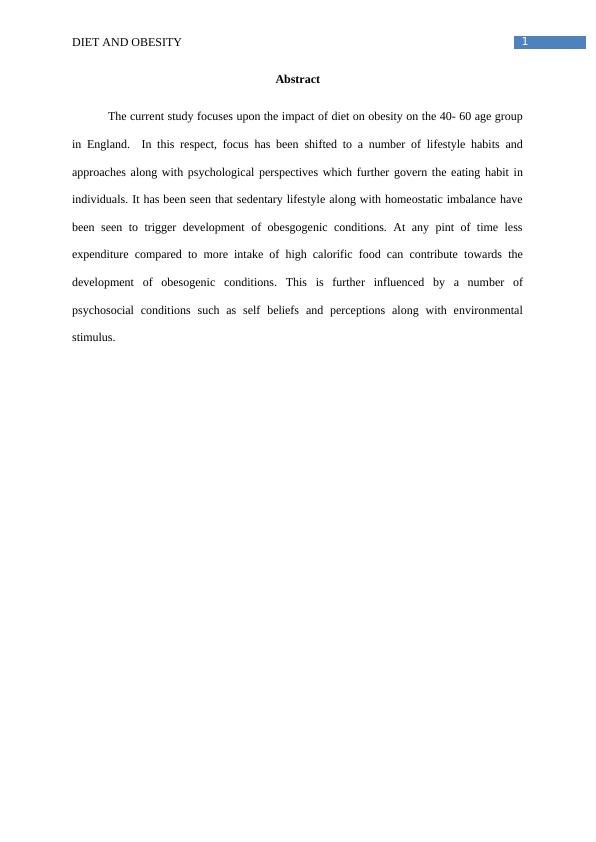
2DIET AND OBESITY
Table of Contents
Proposal..................................................................................................................................3
Rationale....................................................................................................................................3
Literature review:.......................................................................................................................6
Identification of gaps..................................................................................................................8
Methodology of the research:.....................................................................................................8
Dissertation:..........................................................................................................................12
Chapter 1: Introduction.........................................................................................................12
1.1 Background of the study....................................................................................................12
1.2 Rationale of the research....................................................................................................12
1.3 Aim of the research and research objectives......................................................................13
1.4 Significance of the research...............................................................................................14
1.5 Limitations of the research.................................................................................................14
1.6 Structure of the dissertation...............................................................................................15
1.7 Summary............................................................................................................................15
Chapter 2: literature review..................................................................................................16
2.1 Introduction........................................................................................................................16
2.2 Conceptual framework.......................................................................................................16
2.3 Sensory and cognitive aspects of food preference.............................................................17
2.4 Theories of weight and eating behaviour...........................................................................18
2.5 Impact of diet upon obesity within 46-60 age groups in England.....................................19
Table of Contents
Proposal..................................................................................................................................3
Rationale....................................................................................................................................3
Literature review:.......................................................................................................................6
Identification of gaps..................................................................................................................8
Methodology of the research:.....................................................................................................8
Dissertation:..........................................................................................................................12
Chapter 1: Introduction.........................................................................................................12
1.1 Background of the study....................................................................................................12
1.2 Rationale of the research....................................................................................................12
1.3 Aim of the research and research objectives......................................................................13
1.4 Significance of the research...............................................................................................14
1.5 Limitations of the research.................................................................................................14
1.6 Structure of the dissertation...............................................................................................15
1.7 Summary............................................................................................................................15
Chapter 2: literature review..................................................................................................16
2.1 Introduction........................................................................................................................16
2.2 Conceptual framework.......................................................................................................16
2.3 Sensory and cognitive aspects of food preference.............................................................17
2.4 Theories of weight and eating behaviour...........................................................................18
2.5 Impact of diet upon obesity within 46-60 age groups in England.....................................19
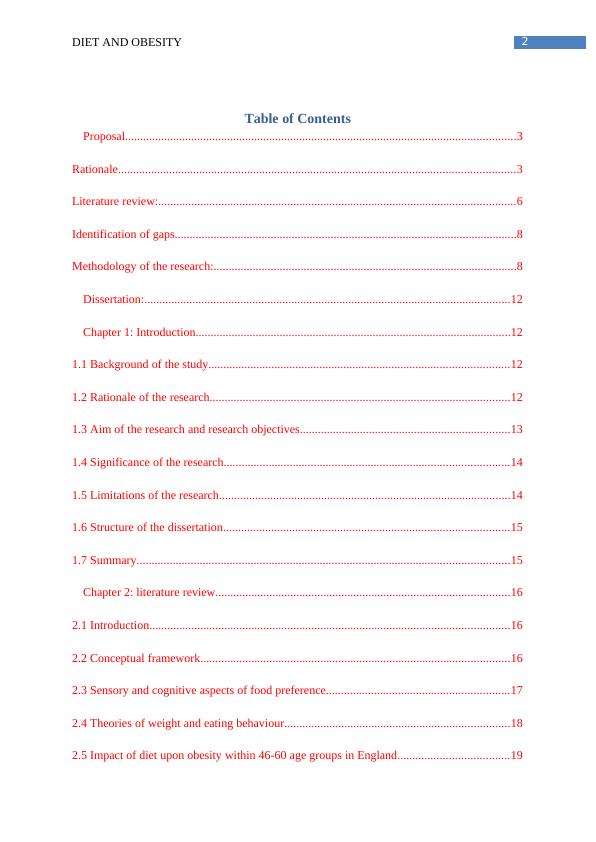
3DIET AND OBESITY
2.6 Homeostatic and self –determination theory of obesity.....................................................19
2.7 Socio-ecological model of obesity focussing on the 40-60 age groups in England...........20
2.8 Gap analysis.......................................................................................................................22
2.8 Conclusion..........................................................................................................................23
Chapter 3: Research methodology........................................................................................24
3.1 Research philosophy..........................................................................................................24
3.2 Research onion...................................................................................................................25
3.3 Approach of the research...................................................................................................25
3.4 Research design..................................................................................................................26
3.5 Research strategy...............................................................................................................27
3.6 Data analysis tools..............................................................................................................27
3.7 Reliability and validity.......................................................................................................27
3.8 Ethical considerations........................................................................................................28
3.9 Summary............................................................................................................................28
Chapter 4: Data analysis.......................................................................................................29
Quantitative Data Representation and Interpretations.............................................................29
Qualitative data Interpretation..................................................................................................36
Thematic analysis:....................................................................................................................38
Theme 1: Effects of binge eating on obesity and health.........................................................38
Theme 2: factors contributing to an obesogenic environment.................................................38
Chapter 5: Conclusion and recommendations......................................................................39
2.6 Homeostatic and self –determination theory of obesity.....................................................19
2.7 Socio-ecological model of obesity focussing on the 40-60 age groups in England...........20
2.8 Gap analysis.......................................................................................................................22
2.8 Conclusion..........................................................................................................................23
Chapter 3: Research methodology........................................................................................24
3.1 Research philosophy..........................................................................................................24
3.2 Research onion...................................................................................................................25
3.3 Approach of the research...................................................................................................25
3.4 Research design..................................................................................................................26
3.5 Research strategy...............................................................................................................27
3.6 Data analysis tools..............................................................................................................27
3.7 Reliability and validity.......................................................................................................27
3.8 Ethical considerations........................................................................................................28
3.9 Summary............................................................................................................................28
Chapter 4: Data analysis.......................................................................................................29
Quantitative Data Representation and Interpretations.............................................................29
Qualitative data Interpretation..................................................................................................36
Thematic analysis:....................................................................................................................38
Theme 1: Effects of binge eating on obesity and health.........................................................38
Theme 2: factors contributing to an obesogenic environment.................................................38
Chapter 5: Conclusion and recommendations......................................................................39
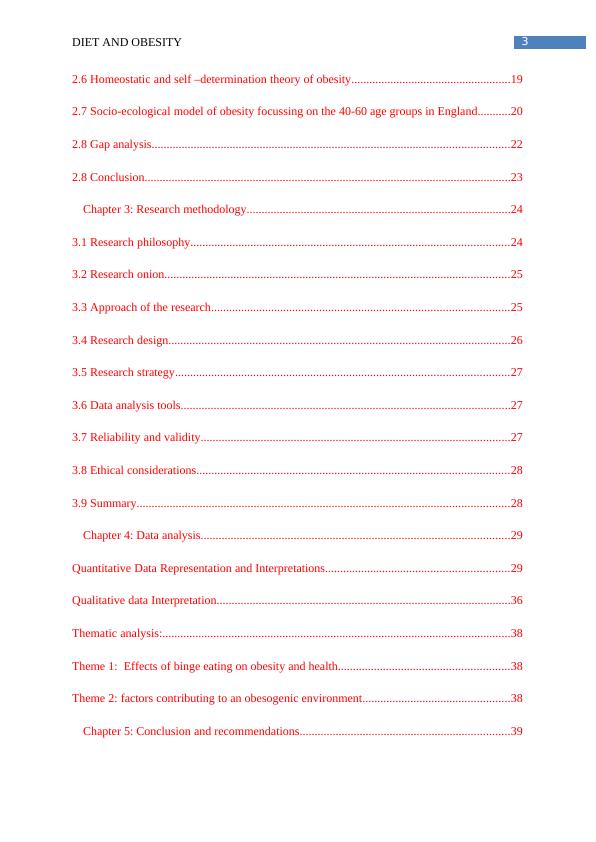
4DIET AND OBESITY
5.1 Conclusion..........................................................................................................................39
5.2 Linking with objectives......................................................................................................40
5.3 Recommendations:.............................................................................................................42
5.4 Research limitations...........................................................................................................43
5.5 Future scope of the study...................................................................................................44
References................................................................................................................................47
5.1 Conclusion..........................................................................................................................39
5.2 Linking with objectives......................................................................................................40
5.3 Recommendations:.............................................................................................................42
5.4 Research limitations...........................................................................................................43
5.5 Future scope of the study...................................................................................................44
References................................................................................................................................47
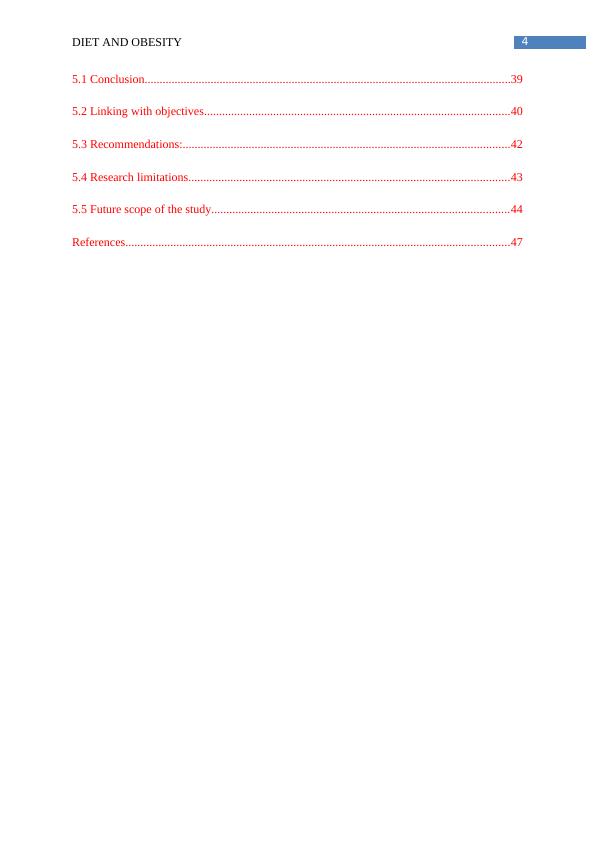
5DIET AND OBESITY
Proposal
Rationale
The current research proposal focuses upon the issues of diet and obesity within the
age group of 40-60 in England. Obesity and binge eating are significant health issues across
all age groups. This is because carrying excess weight can have severe implications on the
physical and mental health of an individual (Munt et al. 2017). Diet has been significantly
linked with obesity where taking food with high calorific value can have negative
consequences such as triggering the development of plague or bad cholesterol in the blood
(Appleby and Key 2016). There were a couple of reasons for undertaking this research which
could be further supported with the help of facts and statistics. 63% adults within the age
group of 40-60 in England were classified as being overweight or obese with a BMI of over
30 (nhs.uk 2018). Additionally, there was a sharp increase in the rate of obesity from 13.2%
to 26.9% in men and 16.4 to 26.85 in women (ons.gov.uk 2018). Overall the prevalence of
obesity rose from 14.9% to 26.95 between 1993 to 2015 (nhs.uk 2018). The obese people
had 2.5 times more chances to develop high blood pressure (Neale et al. 2016). They also had
a 5 times more propensity for the development of type 2 diabetes. Therefore, a proper health
management plan was required to control the high rates of obesity within the adult population
of England. There are multiple causes of obesity which could be further divided into –
physiological, behavioural, psycho-social and environmental factors. Obesity can bring
along with it a number of health complications such as –type 2 diabetes, hypertension,
cancer, heart disease and stroke.
Objectives
The objectives of the research have been discussed as follows:
Proposal
Rationale
The current research proposal focuses upon the issues of diet and obesity within the
age group of 40-60 in England. Obesity and binge eating are significant health issues across
all age groups. This is because carrying excess weight can have severe implications on the
physical and mental health of an individual (Munt et al. 2017). Diet has been significantly
linked with obesity where taking food with high calorific value can have negative
consequences such as triggering the development of plague or bad cholesterol in the blood
(Appleby and Key 2016). There were a couple of reasons for undertaking this research which
could be further supported with the help of facts and statistics. 63% adults within the age
group of 40-60 in England were classified as being overweight or obese with a BMI of over
30 (nhs.uk 2018). Additionally, there was a sharp increase in the rate of obesity from 13.2%
to 26.9% in men and 16.4 to 26.85 in women (ons.gov.uk 2018). Overall the prevalence of
obesity rose from 14.9% to 26.95 between 1993 to 2015 (nhs.uk 2018). The obese people
had 2.5 times more chances to develop high blood pressure (Neale et al. 2016). They also had
a 5 times more propensity for the development of type 2 diabetes. Therefore, a proper health
management plan was required to control the high rates of obesity within the adult population
of England. There are multiple causes of obesity which could be further divided into –
physiological, behavioural, psycho-social and environmental factors. Obesity can bring
along with it a number of health complications such as –type 2 diabetes, hypertension,
cancer, heart disease and stroke.
Objectives
The objectives of the research have been discussed as follows:
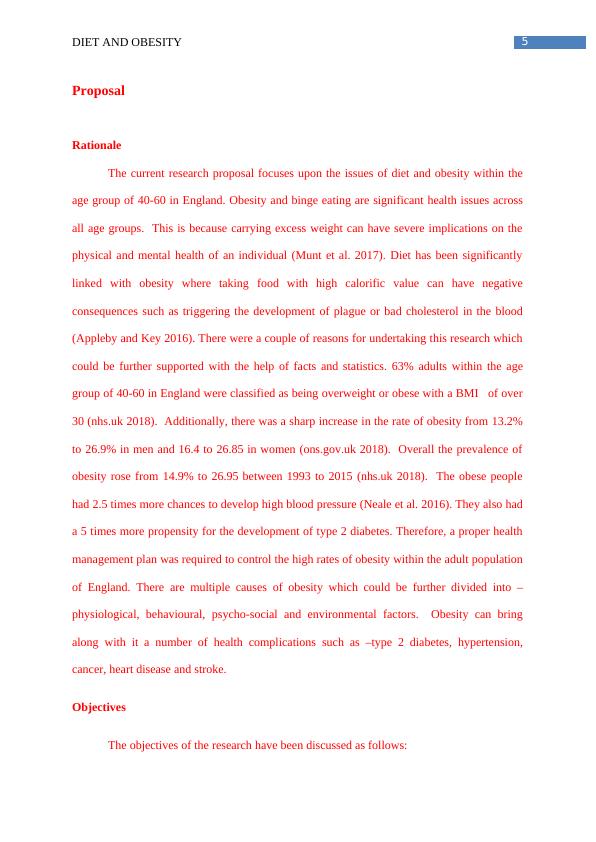
6DIET AND OBESITY
• To identify the factors which developed obesity within the age group of 40-60 in
England
• To identify the health implications of obesity within the age group of 40-60 in
England
• To critically analyse the relation between binge eating and obesity within the age
group of 40-60 in England
• To critically understand the contributory factors towards binge eating
• To identify the control methods for obesity management
Literature review:
The gain in weight could be related to a number of lifestyle and health habits within a
specific age group. Some of these factors are unhealthy diet and physical inactivity which
contribute towards the development of serious conditions such as cardiovascular diseases. As
mentioned by Tomlinson et al. (2016), smoking and alcohol have been seen to be
contributory factors in the development of obesity. The consumption of sugary and fat rich
diets can lead to the development of obesity. On the contrary as argued by Miller et al.
(2016), consumption of vegan diet which is rich in legumes, fruits and vegetables may
prevent the gain of weight. However, no specific evidences have been gained in this regard.
As commented by Mansoor et al. (2016), the lack of physical activity triggers obesity
within individuals. On the other hand, obesity makes physical activity difficult within the
population. TV watching is one of the sedentary activities associated with obesity.
Additionally, short sleep duration has also been seen to trigger obesity (Munt et al. 2017).
There are a number of factors governing obesity in men who tend to associate bigness with
being healthy and sturdy (Wang et al. 2016). Men tend to accumulate abdominal fat which
• To identify the factors which developed obesity within the age group of 40-60 in
England
• To identify the health implications of obesity within the age group of 40-60 in
England
• To critically analyse the relation between binge eating and obesity within the age
group of 40-60 in England
• To critically understand the contributory factors towards binge eating
• To identify the control methods for obesity management
Literature review:
The gain in weight could be related to a number of lifestyle and health habits within a
specific age group. Some of these factors are unhealthy diet and physical inactivity which
contribute towards the development of serious conditions such as cardiovascular diseases. As
mentioned by Tomlinson et al. (2016), smoking and alcohol have been seen to be
contributory factors in the development of obesity. The consumption of sugary and fat rich
diets can lead to the development of obesity. On the contrary as argued by Miller et al.
(2016), consumption of vegan diet which is rich in legumes, fruits and vegetables may
prevent the gain of weight. However, no specific evidences have been gained in this regard.
As commented by Mansoor et al. (2016), the lack of physical activity triggers obesity
within individuals. On the other hand, obesity makes physical activity difficult within the
population. TV watching is one of the sedentary activities associated with obesity.
Additionally, short sleep duration has also been seen to trigger obesity (Munt et al. 2017).
There are a number of factors governing obesity in men who tend to associate bigness with
being healthy and sturdy (Wang et al. 2016). Men tend to accumulate abdominal fat which
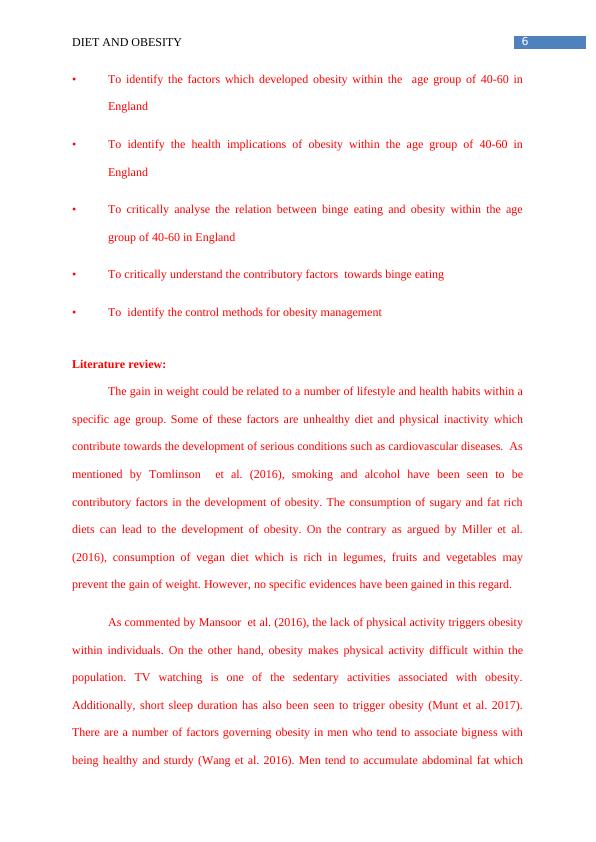
7DIET AND OBESITY
has been associated with cardiovascular disease and type 2 diabetes. The levels of
testosterone reduce from as early as the age of 30 years and have been related with increase
in fat mass (Mansoor et al. 2016). Evidences and study have linked obesity with family
hereditary and genetics. However, as supported by Golden et al. (2015), exercise and proper
diet can control the rate of deposition of adipose tissue. A total of 35,820 deaths in England
and Wales could be related to obesity (nhs.uk 2018). This is because overweight in females
have been further associated with the development of serious health conditions such as
polycistronic ovarian disorder. Obesity corresponds to 7.1 percent of the total deaths in a year
along with contributing towards the additional health costs (ons.gov.uk 2018). Additionally,
environmental and psycho-social factors have also contributed in the development of obesity
within the specified age group population of UK. Some of the factors such as peer pressure
can also contribute towards taking up of unhealthy habits such as alcohol and smoking in an
individual which contributes towards the development of body fats (Feeney et al. 2016).
Older Americans consume food with high levels of sodium and over seasoned foods which
contribute towards the development of excess body fats (Miller et al. 2016). As supported by
Feeney et al. (2016), old age has also been related to loneliness and isolation. Some of this
has been seen to contribute to the development of depressive conditions in the old gage
group. As a supported by Neale et al. (2016), binge eating have been further linked with the
development of obesogenic conditions . However, binge eating is a compulsive behaviour
which has often been linked to low mood and depression. As argued by Watson et al.
(2016), the lack of awareness within the population regarding healthy eating habits can also
result in the development of excess fat tissues in the body.
has been associated with cardiovascular disease and type 2 diabetes. The levels of
testosterone reduce from as early as the age of 30 years and have been related with increase
in fat mass (Mansoor et al. 2016). Evidences and study have linked obesity with family
hereditary and genetics. However, as supported by Golden et al. (2015), exercise and proper
diet can control the rate of deposition of adipose tissue. A total of 35,820 deaths in England
and Wales could be related to obesity (nhs.uk 2018). This is because overweight in females
have been further associated with the development of serious health conditions such as
polycistronic ovarian disorder. Obesity corresponds to 7.1 percent of the total deaths in a year
along with contributing towards the additional health costs (ons.gov.uk 2018). Additionally,
environmental and psycho-social factors have also contributed in the development of obesity
within the specified age group population of UK. Some of the factors such as peer pressure
can also contribute towards taking up of unhealthy habits such as alcohol and smoking in an
individual which contributes towards the development of body fats (Feeney et al. 2016).
Older Americans consume food with high levels of sodium and over seasoned foods which
contribute towards the development of excess body fats (Miller et al. 2016). As supported by
Feeney et al. (2016), old age has also been related to loneliness and isolation. Some of this
has been seen to contribute to the development of depressive conditions in the old gage
group. As a supported by Neale et al. (2016), binge eating have been further linked with the
development of obesogenic conditions . However, binge eating is a compulsive behaviour
which has often been linked to low mood and depression. As argued by Watson et al.
(2016), the lack of awareness within the population regarding healthy eating habits can also
result in the development of excess fat tissues in the body.
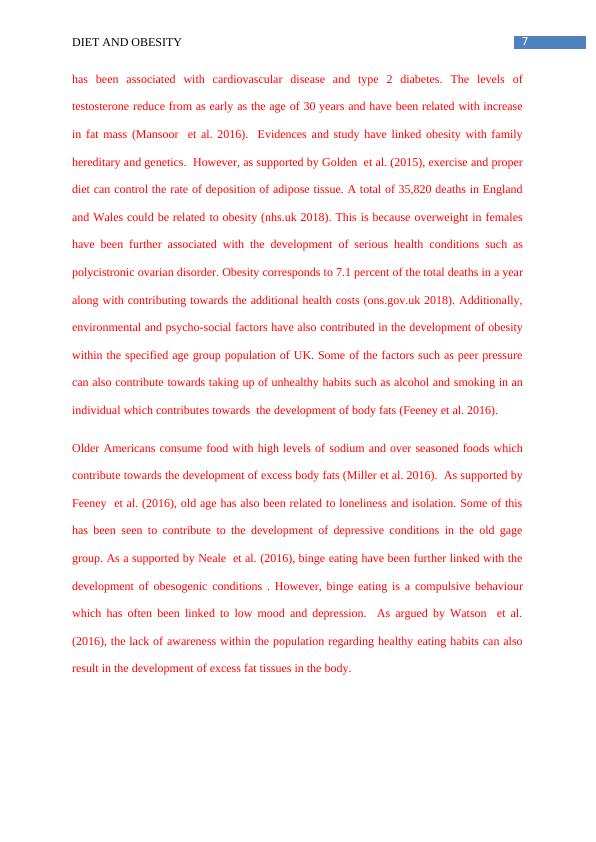
End of preview
Want to access all the pages? Upload your documents or become a member.
Related Documents
Self-management for people with types 2 diabetes among elderly in Englandlg...
|46
|11939
|54
STRM044 : Business Research Projectlg...
|70
|15996
|60
Dissertation on The Freight Forwarder Industrylg...
|55
|15157
|28
XXX in China: Marketing Strategies for Expansionlg...
|68
|16736
|25
Opening of Multi-Cuisine Restaurant in Delhi, India - Business Research Projectlg...
|84
|15330
|227
(BSM777) Milestone Risk M.S.c Hospitality and Business Managementlg...
|61
|17596
|309
